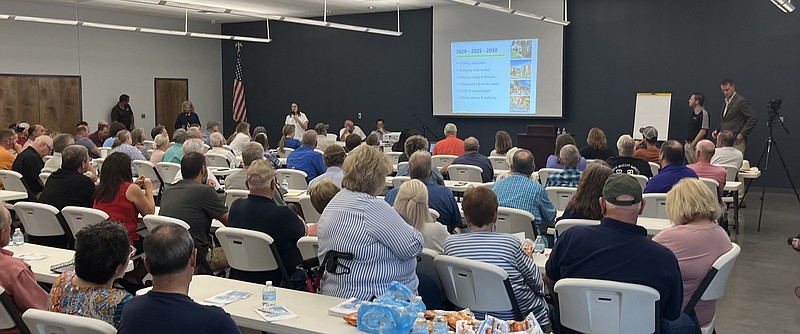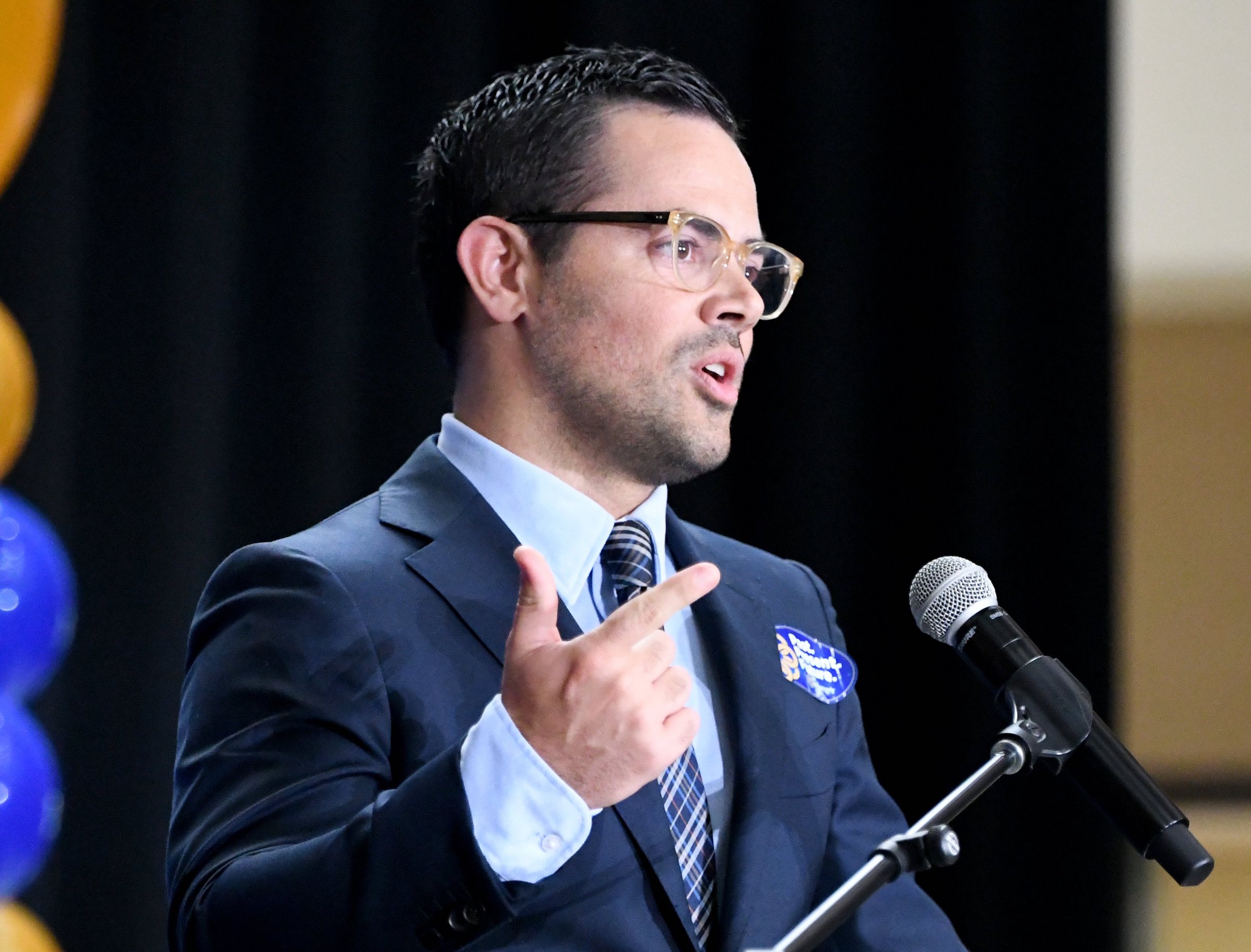To Dale Vandergriff, who once farmed more than 300 acres on the northern end of Hamilton County, Sale Creek needs to remain a place for family farms.
But Vandergriff, who still owns and farms 70 acres, fears that Chattanooga's growth is threatening to destroy what has made rural Hamilton County special and helped feed the country.
"Sale Creek is a farming community and was once known as the Peach Capital, but I'm afraid the family farm in this area is a thing of the past," Vandergriff said during a public hearing on county growth Monday night. "I'm trying to preserve my farm for my kids so they can hunt, fish, farm and enjoy the open spaces that make this place special. If we don't preserve that, I'm afraid we're going have subdivisions and houses and apartments everywhere just like they do now in Ooltewah."
Vandergriff and other Sale Creek area residents voiced concerns Monday over everything from apartments, subdivisions and rental homes to solar power arrays and battery storage facilities taking up undeveloped properties and farmland on the northern edge of Hamilton County.
Many among the overflowing crowd who packed the Sale Creek Volunteer Fire Department urged county leaders to limit growth in and around Sales Creek, Bakewell and Soddy-Daisy.
The Chattanooga/Hamilton County Regional Planning Agency conducted the public hearing Monday as the first of a half dozen such public hearings in the next six weeks to help gather public input for the developing plan designed to guide the growth in unincorporated parts of the county for the next 15 years.
The county has been working with the Chattanooga-Hamilton County Regional Planning Agency and RaganSmith Associates to develop the plan. It will cover a range of issues, from education and transportation to infrastructure and zoning regulations. Through the initiative, stakeholders will have the opportunity to collaborate on the plan, according to the Regional Planning Agency.
(READ MORE: Planning effort taking on Hamilton County growth)
Unlike municipalities in the county that often have more restrictive zoning rules and building requirements, unincorporated county lands in Tennessee operate more like "the Wild West," Hamilton County Mayor Weston Wamp said during the hearing in Sale Creek.
One of the reasons officials are going through this process is that the county, outside of incorporated cities within Hamilton County, has quickly gone from a rural to a suburban scale of growth, Wamp said — and in parts of Ooltewah even urban.
"Where there haven't been plans put in place, we're just subject to what in many times is just arcane state law," Wamp said. "We're going to have to look at all of this much closer than we have in the past, and that is why we are doing this plan."
Planning for growth
The plan will examine how the growing population and changing retail market is affecting housing supply and demand, roads and infrastructure needs, and the environment and quality of life in the region.
The plan will not change any existing zoning or guarantee funding for any recommended improvements, but it is designed to guide the physical growth of the county and inform capital projects and budgets, as well as future zoning changes and development plans, Wamp said.
"We obviously have growth in our county, and a lot of people think it is a great place to move to," Dan Reuter, the executive director for the Chattanooga/Hamilton County Regional Planning Agency, said during Monday's hearing. "Those are going to be challenges to us, and that's why we are doing this plan because we're going to be dealing with this growth and the issues it creates for a long time. With those challenges comes things like more traffic on our roads, more needs for school facilities and fire services."
(READ MORE: How Chattanooga's growth drowns out the night sky for stargazers)
Reuter tried to reassure residents concerned about efforts to discourage automobile travel by promoting walking to work and other parts of the so-called 15-minute city — an urban planning concept in which most daily necessities and services, such as work, shopping, education, health care and leisure can be easily reached by a 15-minute walk or bike ride from any point in the city.
"I call Hamilton County a one-hour city," Reuter quipped. "I promise you you can keep your car for the rest of your lives."
Public input sought
The plan, in Reuter's view, will be like "management documents" for the city and county leaders in Hamilton County to guide their decision-making for the future.
"Our goal is not to have people sitting in traffic too long," Reuter said. "I like to think if we plan well enough, we may never have that traffic problem. We've got to be planning for future growth and planning our roads and infrastructure."
Members of the public are invited to take a survey and offer their views on the new growth plans until Sept. 25 at planhamilton.org.
(READ MORE: Chattanooga-area growth plan aims to boost air service, business incubator, Gig City)
Reuter said the Regional Planning Agency expects to submit plans for the unincorporated parts of Hamilton County for the County Commission to consider and possibly adopt by next spring.
Future plan meetings
— Ooltewah, Birchwood and Georgetown area meeting at 6 p.m. Thursday at the Ooltewah High School gym.
— White Oak, Apison and Brainerd area meeting at 6 p.m. Aug. 29 at East Hamilton High School.
— Middle Valley and Lakesite area meeting at 6 p.m. Sept. 7 at the Chester Frost Park pavilion.
— Soddy-Daisy area meeting at 6 p.m. Sept. 14 at Soddy Daisy High School.
— Signal Mountain and Walden area meeting at 6 p.m. Oct. 3 at the Bachman Community Center in Walden.
Source: Chattanooga/Hamilton County Regional Planning Commission
Solar, battery concerns
Several residents Monday voiced concerns about an apartment complex planned along Highway 27 in Sale Creek, the potential of solar farms and an EPB battery storage facility being installed in the area to help provide backup power to limit power outages.
Mike McElhone, who lives on North Star Circle in Sale Creek, said he objected to an initial plan by EPB to locate a battery facility near his home.
"What worries me about these solar farms and battery facilities is where they want to put them," McElhone said during Monday's hearing. "EPB wanted to put three battery storage containers right at the end of the watershed about 300 yards or less from my well and not too far from where the lake is. If that thing ever caught fire, they'd have to pollute the lake to put such a fire out."
Ultimately, McElhone said EPB relocated the site for the battery storage facility.
EPB spokesman J. Ed. Marston said EPB met with residents in the area and selected the new site for the energy storage facility, which will be capable of storing up to 2.5 megawatt-hours of electricity, or enough to power the 400 homes in that area for up to four hours.
"This is an area where we don't have the redundancy in our coverage that we do in most areas, and we're trying to reduce outages and help maintain power delivery for those in the northern part of our service territory," Marston said.
EPB is also working with an outside vendor to develop a couple of solar farms capable of generating 15 megawatts of electricity in Northern Hamilton County. The solar farms are being added under TVA's flexible power contacts with its local power companies like EPB and should help EPB to lower its overall energy costs.
Contact Dave Flessner at dflessner@timesfreepress.com or 423-757-6340.


